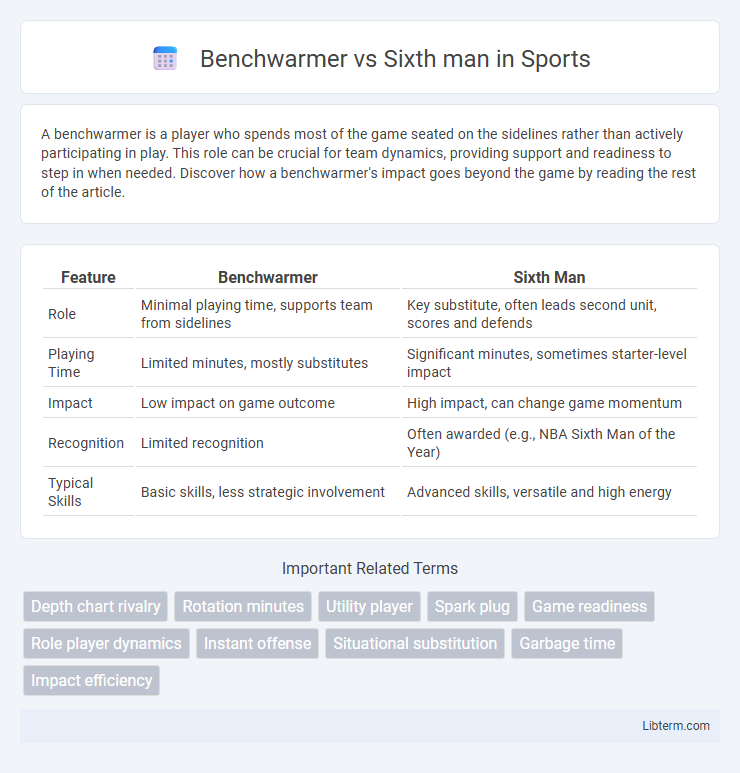A benchwarmer is a player who spends most of the game seated on the sidelines rather than actively participating in play. This role can be crucial for team dynamics, providing support and readiness to step in when needed. Discover how a benchwarmer's impact goes beyond the game by reading the rest of the article.
Table of Comparison
| Feature | Benchwarmer | Sixth Man |
|---|---|---|
| Role | Minimal playing time, supports team from sidelines | Key substitute, often leads second unit, scores and defends |
| Playing Time | Limited minutes, mostly substitutes | Significant minutes, sometimes starter-level impact |
| Impact | Low impact on game outcome | High impact, can change game momentum |
| Recognition | Limited recognition | Often awarded (e.g., NBA Sixth Man of the Year) |
| Typical Skills | Basic skills, less strategic involvement | Advanced skills, versatile and high energy |
Understanding the Benchwarmer and Sixth Man Roles
The benchwarmer in basketball typically refers to a player who spends most of the game on the sidelines with limited playing time, often providing energy and support during practices and team morale. The sixth man is a key substitute who usually comes off the bench to play starter-level minutes and significantly impacts the game through scoring, defense, or playmaking. Understanding these roles helps define team strategies, with the sixth man serving as a primary contributor and the benchwarmer fulfilling a more supportive, developmental role.
Historical Evolution in Basketball Bench Roles
The evolution of bench roles in basketball reflects a strategic shift from simple substitutions to specialized positions, with the sixth man emerging as a critical contributor who often matches starter-level impact. Historically, benchwarmers were primarily seen as marginal players with limited minutes, but rising tactical complexity in the game elevated the importance of versatile, high-energy reserves capable of changing the game's momentum. The sixth man's role gained prominence in the mid-20th century through legendary players like Bill Walton and Manu Ginobili, who demonstrated the value of skilled players coming off the bench to sustain or enhance team performance, thus redefining team dynamics and rotation strategies.
Key Differences: Benchwarmer vs. Sixth Man
A benchwarmer typically refers to a player who spends most of the game on the sidelines with limited playing time, often contributing minimally to the team's performance. In contrast, the sixth man is a key substitute who regularly enters the game to provide significant scoring, defense, or energy, often playing starter-level minutes. The sixth man is strategically utilized by coaches to maintain or shift momentum, making them a vital part of the team's rotation, unlike the benchwarmer, who has a marginal role.
Impact on Team Dynamics and Morale
Benchwarmers contribute less consistently to team performance, often resulting in lower morale due to limited playing time and involvement. Sixth men play crucial roles by providing energy, scoring, and defense off the bench, positively influencing team dynamics and boosting overall morale. Their ability to maintain or change game momentum creates a more cohesive and motivated team environment.
Contribution to Game Strategy
A benchwarmer typically provides limited impact on game strategy due to inconsistent playing time and minimal involvement in critical moments. In contrast, a sixth man plays a crucial role by offering strategic flexibility, often substituting starters to maintain intensity and scoring without disrupting team dynamics. Coaches rely on the sixth man to adapt to game flow, balance lineups, and exploit specific matchups, significantly influencing overall game strategy.
Notable Sixth Men in Basketball History
Notable sixth men in basketball history include players like James Harden, Manu Ginobili, and Lou Williams, who have significantly impacted their teams despite not starting games. These players often bring scoring, energy, and playmaking off the bench, exemplifying the strategic value of the sixth man role in the NBA. Their ability to shift game momentum and provide consistent production makes the sixth man a crucial asset in modern basketball strategy.
Challenges Faced by Benchwarmers
Benchwarmers face the challenge of staying mentally prepared despite limited playing time, often sitting on the sidelines while game intensity rises. They must maintain peak physical conditioning and sharpness to contribute effectively when called upon unexpectedly. Additionally, benchwarmers struggle with building confidence and rhythm without consistent court presence, impacting their overall performance and team cohesion.
Pathways to Becoming a Sixth Man
The pathway to becoming a sixth man typically involves demonstrating versatile playing skills and consistent impact during limited minutes, often starting as a benchwarmer. Players who excel in practice, adapt to multiple roles, and show strong defense or scoring bursts increase their chances of transitioning from a benchwarmer to a key rotational player. Coaches prioritize players with high basketball IQ and energy contributions off the bench to solidify the sixth man role in professional and collegiate teams.
The Psychological Aspect of Each Role
Benchwarmers often face feelings of frustration and lower self-esteem due to limited playing time, requiring resilience and a strong mental attitude to stay motivated. Sixth men experience a unique psychological balance, needing to shift quickly from observer to key contributor, demanding mental preparedness and confidence to impact the game effectively off the bench. Both roles require strong psychological adaptability, but the sixth man typically develops a heightened sense of readiness and competitive focus compared to the benchwarmer.
Future Trends: Changing Importance of Bench Players
The future of basketball emphasizes the evolving role of benchwarmers and sixth men as teams increasingly rely on deep rotations to maintain intensity throughout games. Advanced analytics highlight the strategic value of versatile bench players who can adapt to multiple positions and contribute efficiently on both offense and defense. Continuous improvements in player development and injury prevention also enhance the impact of bench players, making them indispensable assets in achieving sustained team success.
Benchwarmer Infographic

 libterm.com
libterm.com